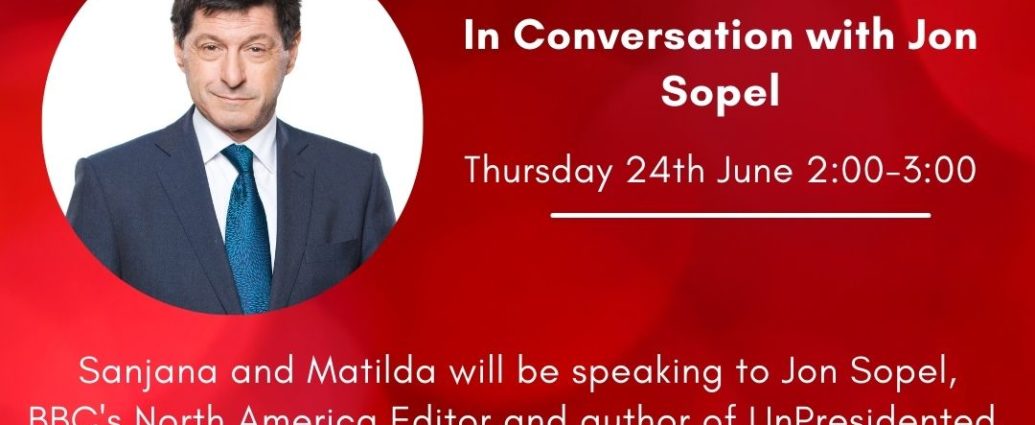Eva Bailey
On Thursday 24th June, Opinion Editor Sanjana Idnani and Current Affairs Editor Matilda Head sat down with the BBC’s North America Editor Jon Sopel. This episode of Empoword’s ‘In Conversation With…’ series saw Jon offer many pearls of wisdom from his immensely successful career, with topics ranging from the hard hitting realities of reporting in a warzone to starting a podcast in a global pandemic.
Given the political nature of Jon’s career, it is no surprise that his love of politics is what kickstarted his interest in journalism. After graduating from the University of Southampton (having presided over his Student Union), Jon told of his disappointment at being faced with numerous rejections when trying to enter the job market. However, when he saw the opportunities available to a friend studying at Portsmouth Journalism College around the time of the Falkland War, it ignited his desire to pursue a journalistic career, and he took the first steps towards becoming the successful political journalist that we know today.
After joining the BBC as a reporter and producer for BBC Radio Solent in 1983, Jon later became the chief political correspondent for BBC News 24, and then Paris Correspondent. He has since reported for the BBC News Channel and is now based in Washington DC, covering news stories across North America. His career has certainly been varied, and the pandemic appears to have broadened his skillset further: in 2020, he began presenting the ‘Americast’ podcast alongside Emily Maitlis and Anthony Zurcher, and he published his fourth book UnPresidented: Politics, pandemics and the race that Trumped all others earlier this year.
With a wealth of experience under his belt, Jon had plenty to offer on the subject of multimedia journalism, something that has been the topic of much conversation over the last year of the Covid-19 pandemic. Despite recognising the removal of the “brick wall” that used to stand between TV radio and TV, Jon maintained that writing for each is an “art” that requires a different skillset – something that he said journalists are almost expected to have in this day and age. However, he was wholly positive about the changes that the pandemic has provoked within the industry; while formal meetings used to be necessary for every interview, he seemed certain that the more relaxed “Zoom” approach would stay with us in the post-pandemic world.
Like every journalist working for big organisations such as the BBC, Jon has had to master the art of remaining impartial. “People are not paying to hear the journalist’s views,” as he put it, though he was quick to dismiss the common misconception that impartiality is equivalent to a bland reporting style. In fact, Jon was insistent that the opposite is true: as he sees it, journalists have to be led by the story, and have a duty to call out bad behaviour and lies in the form of “aggressive” impartiality. As he was privy to the exaggerations of Donald Trump’s press secretary Shaun Spicer, he seemed incredibly passionate about refusing to accept incorrectness when reporting to the general public – something that greatly inspired me as a young journalist.
Naturally, Sanjana and Matilda went on to steer the discussion towards Jon’s experiences with Donald Trump and, more recently, Joe Biden. His position as North America Editor allowed him to observe the Trump presidency with almost alarming proximity. Indeed, I was shocked to hear Jon’s story about his phone being tampered with because the Whitehouse wanted to deny the accurate leak he’d been given about an address that Trump would make later that day. This then led to Jon jokingly acknowledging that the best parts of the Biden presidency for journalists – “order, a chain of command, discipline and a reporting structure” – were also the worst. He confessed that the “madness” of Trump was exciting from a journalistic perspective, despite appreciating that the “stability” of Biden was probably better on an international level.
Alongside his encouragement for young journalists who are looking to break into the industry, Jon offered a few words of caution. His own devastating anecdote about flying with an RAF pilot who was collecting dead bodies after the Lockerbie plane crash served as a reminder that journalists have a responsibility to look after one another, particularly when reporting on such sensitive issues. In an industry that can be cut-throat and ruthless, I’m sure this reminder was welcomed by many viewers.
It seems apt to conclude on what Jon hailed as the best piece of advice he was ever given. By sharing a Chinese proverb – “If you stand by the riverbank long enough, the body of your enemy will float past” – he opened up a fascinating discussion about being too deterministic when thinking about your career goals. He elaborated by saying that, while many young journalists feel blocked by those higher up, patience and resilience will often allow a great career to flourish, even though it may not be the linear progression one might have planned. As Empoword contributors take their first steps in the industry, I hope the wisdom shared by Jon Sopel in this workshop provides comfort and encouragement for years to come.
Featured image provided by Empoword Journalism.

